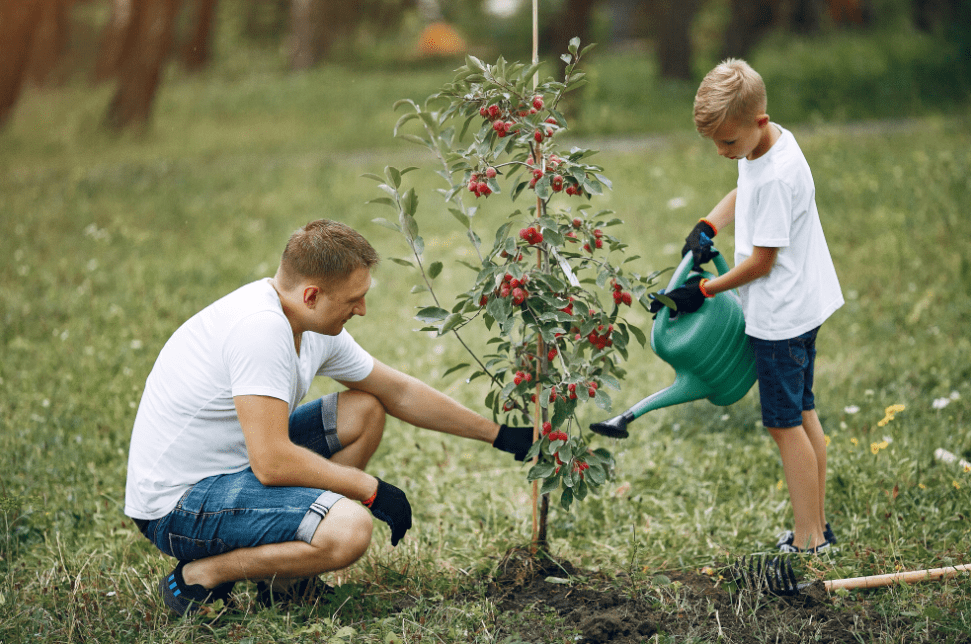
It’s never been more apparent that we all have a duty to care for the planet. Once you have kids, it’s even harder to ignore. If you’re wondering how to help your kids become good global citizens who do their part to take care of our fragile little world, then here are 5 things you can try.
Grow Food At Home
Growing your own food is a great way to give kids a real appreciation for nature. Watching seeds turn into plants that then produce fruits and veggies is magical.
If you have space, you could plan and build a food garden as a family project. Make sure everyone gets involved. That way, everyone will feel the accomplishment when you’re ready to harvest your crops.
Even if you don’t have access to a garden, some plants do well in small pots. As long as you can give them sunlight, they’ll do just fine. Some good options for this are tomatoes, herbs, and lettuce.
An added bonus of getting your kids involved in growing food is that they’re more likely to try vegetables that they grew themselves.
Make Compost
I haven’t met many kids who don’t like getting dirty. Making compost is a great excuse for them to play in the dirt. It’s also an excellent way to make real use of your food waste instead of sending it to landfill.
Starting a compost pile is really easy. You just start with a straw or stick base. Then you alternate wet and dry layers of compostable material. Once you’re up and running, the compost pile will need to be turned every now and then.
A good compost pile should have a mix of carbon and nitrogen sources, but significantly more carbon. If you and your kids aren’t sure what should go in, why not do some reading on the subject? Reading is a great way to introduce kids to new ideas and learn a bit yourself. You can find loads of books with great info through online reading libraries. That way, you aren’t using up more paper and ink.
If space is an issue, you can make a mini compost pile in an old 2l soda bottle. Just cut the top off and then fill it up in the same way you would a big compost pile. The clear sides will let your kids see the magic as it happens.
Talk About The 6 Rs
I don’t know about you, but when I was young, there were only 3 Rs. So here’s the 6 Rs in case you’re not familiar with them:
Refuse - Just use less stuff. If you don’t need it, don’t buy it.
Reduce - If you need to use something, use the smallest amount possible.
Rethink - Consider the items you use. Can they be made more sustainable?
Repair - Choose products that can be easily repaired and use them until you can’t anymore.
Reuse - When an item no longer works for it’s intended purpose, use it for something else.
Recycle - When all else fails, recycle.
A great way to start conversations about these ideas is to do it while you’re shopping. No matter how young your kids are, there are loads of benefits to taking them with you to the shops. If you have really little ones, then a shopping cart cover can keep them happy and entertained while you take the time to talk with your older kids about what you’re buying and why.
Talk About The ‘Why’
The 6 Rs are a good start. They outline the types of behaviors you need if you want to be sustainable. But, you really need to take the time to talk about why you’re doing these things.
No matter how old your kids are, they will be more likely to do something if they understand the reason for it. So it’s never too early to start talking about the environment and sustainability with your kids.
When you talk to your kids about recycling, it can be a good idea to focus on the positive aspects. For example, we refuse plastic straws to protect marine animals. You might feel a lot of anxiety about the state of the planet, understandably. However, there’s no need to burden your kids with that anxiety, not until they’re ready to deal with it.
Set A Good Example
If you’re serious about teaching your kids to be sustainable, you need to set an example for them to follow. If your words and your actions don’t match, then your message will fall on deaf ears. Sustainability is a great thing to aim for as a family. That way, you can all build good habits together.
It might not have been Gandhi who said it, but the sentiment is definitely applicable - be the change you want to see in the world.
Written by Cristin Howard
About the Author
Cristin Howard runs Smart Parent Advice, a site that provides parenting advice for moms and dads. Cristin writes about all of the different ups and downs of parenting, provides solutions to common challenges, and reviews products that parents need to purchase.
You may also like
Green Camping: How to Be an Eco-Friendly RVer
Great Sustainable Materials For Your New Home Design
3 Eco-Friendly Activities To Do With The Family
Sustainable Trends For Interior Design
